The Rationals was the most important group in Hugh “Jeep” Holland’s stable of bands who recorded on his A-Square label in the 1960’s. Although they produced a batch of excellent songs that displayed the powerful instrumental attack of drummer Bill Figg, bassist Terry Trabandt, and guitarist Steve Correll, along with the best Michigan vocalist west of Bob Seger in Scott Morgan, they never reached their full potential as a recording act. Only one of their singles charted nationally, and rival Michigan bands such as the MC5, the Stooges, SRC, Frost, the Amboy Dukes, and the Bob Seger System all recorded albums for major labels well before the Rationals finally released their one and only LP in 1970.
According to an excellent interview with Scott Morgan by Ken Shimamoto, the story of the Rationals began in the college town of Ann Arbor in 1962. Steve Correll was left-handed but learned to play a right-handed guitar upside down. He heard that Morgan also played guitar and called him on the phone to suggest that they get together and jam. 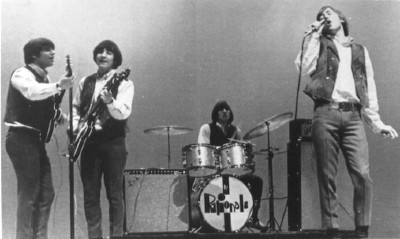 Rationals (L to R) Steve Correll, Terry Trabandt, Bill Figg, Scott Morgan
Rationals (L to R) Steve Correll, Terry Trabandt, Bill Figg, Scott Morgan
Both Morgan and Corrrell attended the same junior high school, and came from musical families who encouraged their interest in playing an instrument. The boys began to meet in the recreation room at Correll’s house to play instrumentals by the Ventures and Lonnie Mack on their primitive electric guitars and small amplifiers.
Morgan and Correll soon began rehearsing in earnest, and they performed their first gig in front of Klines Department Store on Main Street in Ann Arbor. After making some early demo recordings of instrumentals with DJ Ted Heisel from local station WHRV, the twosome eventually linked up with an older drummer named Bob Prezfelder, who was attending Pioneer High School.
The trio soon began playing private parties, dances, and other social events as ‘The Rationals’. Steve Correll’s older brother, Richard, came up with the band name from rational numbers, a mathematical term for a whole number or the quotient of any whole numbers, excluding zero.
The young band hit a bump in the road in 1963 when, after completing the 8th grade, Steve Correll’s parents decided to send him to a military school in Lake Geneva, Wisconsin. Morgan then started playing with guitarist Terry Trabandt and drummer Bill Figg. The trio mostly jammed together and played at a few parties during that school year.
Scott Morgan remembered that he was “totally glued to the radio in those days”. He was inspired by the sounds of Motown, and by the Beatles and other British Invasion bands like the Zombies and the Kinks. The first song that Morgan ever sang during a band performance was “Money”, an early Motown hit by Barrett Strong that had been covered by the Beatles in 1964, and had become a big radio smash all over again in Detroit. 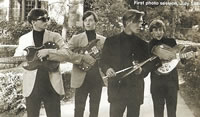 Correll, Trabandt, Figg, and Morgan
Correll, Trabandt, Figg, and Morgan
After one year of military school, Steve Correll’s parents enrolled him back in Ann Arbor for his 9th grade year in the fall of 1964. He quickly rejoined Morgan in the Rationals as a guitarist, and Trabandt moved over to bass in order to stay in the band.
With a set list inspired by an older Ann Arbor instrumental group called the Renegades, the Rationals played a dance at a roller rink in nearby Ypsilanti hosted by Don Zemanski, (a.k.a. Don Z) of AM station WXYZ in Detroit. Zemanski was impressed with the band and invited them over to his house to put down some of their material on his two-track stereo reel-to-reel tape recorder. Besides the instrumentals that comprised most of their sets, these recordings also included an early version of Scott Morgan’s British-sounding composition, “I Want To Walk With You”.
Intrigued by the hits of the British Invasion bands, the Rationals gradually began to perform more songs with vocals. Morgan and Correll were also starting to write some impressive original material. Looking to make their first record, the band met Hugh “Jeep” Holland, who was working at Discount Records on State Street in Ann Arbor, and asked him to help with the band. Holland began acting as the Rationals’ manager, and he also formed a company called A-Square Productions and became their booking agent.
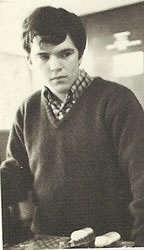 Hugh "Jeep" Holland
Hugh "Jeep" Holland
Holland was very charismatic and knowledgeable about music. He was also very connected to the U of M college scene, and he got the band a number of well-paying gigs at fraternity parties on campus. It was the first real money the Rationals had ever made
When he was working at the Discount Records store, Jeep would give the band members the keys to his apartment on North Division so that hey could go and listen to his extensive record collection. Holland also wanted to hear the band’s original songs so he arranged for the Rationals to record some demo material at WCBN, the campus radio station. It was this set of recordings that gave Holland the idea of starting his own label, A-Square Records, in 1965.
Holland next took the Rationals to Special Recording in Detroit on July 1, 1965 to record their debut single and A-Square’s first release. Morgan and Correll teamed up to write the A-side, “Gave My Love”, while “Look What You’re Doing (To Me Baby)”, Scott Morgan’s crunching Kinks-styled rocker, was on the B-side. Both sides of the single reached # 1 on local station WAAM’s “Sweet Sixteen” chart the first week of August.
The next month, Holland booked their first television appearance on Teen Town, hosted by Robin Seymour from the Boblo Island amusement park. The band’s local hit also landed them a four-day gig at Ward’s Department Store in Detroit, a rash of U of M fraternity parties, and appearances at big market radio stations CKLW in Windsor and WTAC in Flint. “Gave My Love” would go on to spend four weeks at # 1 on the WHRV charts that summer, and when Morgan, Correll, Trabandt, and Figg returned to school in the fall, they were celebrities.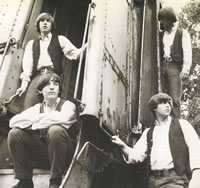 The Rationals
The Rationals
Holland helped lock in the Rationals’ local following by booking them for a tour of the shopping malls in the Detroit area. He also had the band play any number of DJ hops for free or for gas money. This would build a relationship with the jocks that could help get the Rationals a slot on important gigs, and also earn them some favorable consideration in getting their records played on the air.
The Rationals’ strategy for getting airplay didn’t help their second single. Recorded at United Sound studios in Detroit on January 29, 1966, the British Invasion-inspired “Feelin’ Lost” was composed by Morgan and Correll, and it featured a bass drum overdub from Jim “Iggy” Osterberg. The flipside, “Little Girls Cry (Deon’s Song)” was written especially for the Rationals by fellow Ann Arbor native Deon Jackson, who had just released his first big hit, “Love Makes The World Go Round” on the Carla label out of Detroit.
Jeep Holland produced the single with some uncredited assistance from Bob Seger, who was playing with Doug Brown & The Omens at the time. Despite the quality and obvious commercial potential of the single, “Feelin’ Lost” was rejected by many Detroit stations because they felt it sounded too much like the Beatles.
After the failure of the “Feelin’ Lost/ Little Girls Cry” single, the Rationals recorded a cover of “Gloria” which had been written and released by Van Morrison and Them. Unfortunately, Chicago’s Shadows of Knight beat them to the punch, and had a massive hit with their version of “Gloria” in the spring of 1966. Holland’s plan to release the Rationals’ excellent take of the song as their third single was scrapped.
 Rationals on Swingin' Time
Rationals on Swingin' Time
The band made its first of over 30 appearances on Robin Seymour’s Swingin’ Time TV show in March, and they also played regularly at the Mt. Holly dances sponsored by Bob Dell of WTAC. In April, the Rationals opened for the Young Rascals at Daniel’s Den in Saginaw. The Young Rascals were touring behind their first big hit, a cover of the Olympics’ R&B song, “Good Lovin’”, and their choice of material would serve as an inspiration for the Rationals’ next single.
Jeep Holland had a great collection of R&B records, and he helped the Rationals to realize that a lot of the British rock that they admired drew very heavily from the genre. Holland worked hard on improving the band’s stage presence, and it was his idea to have Scott Morgan stop playing guitar and to concentrate on being the front man for the group. Jeep also started taking a more active role in choosing the band’s material.
The Rationals’ new musical direction was displayed on their third single, “Respect/Leavin’ Here”. The record was produced by Holland and Les Cooly at United Sound in the summer of 1966. Jeep Holland was a big fan of “Leavin’ Here”, a minor hit for Motown’s Eddie Holland in 1964. The Rationals did 27 takes of the song which was the designated A-side of the single. 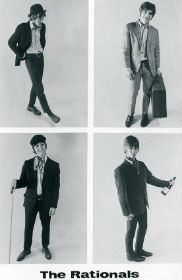
“Respect”, on the other hand, was completed in just 3 takes. The song had been a # 4 R&B hit for Otis Redding in 1965, and the Rationals had been working on an arrangement of the song for about three months. Their version was more stripped-down and rocking than Redding’s, and featured Correll and Trabandt singing what had been the horn parts in the original. Scott Morgan’s powerful lead vocal and harmonica playing caused local deejays to flip the record over and start playing “Respect” rather than “Leavin’ Here”.
After “Respect” became a local hit on A-Square, the Rationals were signed to Cameo-Parkway Records by Neil Bogart. Bogart, who had also signed fellow Michigan artists, Jamie Coe, ? And The Mysterians, Bob Seger & The Last Heard, and Terry Knight & The Pack to the label, liked the Rationals and when Cameo released “Respect” nationally, it spent three weeks in the Billboard Hot 100, peaking at # 92.
The momentum generated by “Respect” led to gigs as the opening act for the Yardbirds and the Beau Brummels. The Rationals continued to appear regularly on Robin Seymour’s Swingin’ Time and also made their first appearance on Lloyd Thaxton’s Upbeat TV show in Cleveland. It was from the Jefferson Airplane, also appearing on Upbeat, that Jeep Holland got another idea to promote the Rationals. The members of the Airplane were handing out buttons to everyone in the studio that said “Jefferson Airplane Loves You”. Holland knew a great gimmick when he saw one, and within a week of his return to Ann Arbor, he was already circulating buttons that read “Think Rational”.
Another Holland promotion that helped drive the Rationals’ popularity was the fan club newsletters that provided exclusive information about each band member. The club was run by a group of girls who were friends of the band and called themselves the RPs (Rationals Promoters).
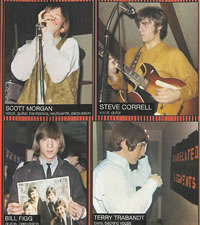
But the event that really displayed how big the band had become was WKNR’s thank you show for the kids who participated in the “ALSAC Teenager’s March” to raise funds for the treatment of children with leukemia. The free concert drew over 12,000 teens to Cobo Hall, but the show was disrupted soon after the Rationals appeared. An army of screaming girls started running down the aisles, knocking over barricades, and attempting to jump onto the stage. The resulting chaos caused police to shut down the show.
The Rationals wrapped up 1966 by being named the most popular group in Detroit radio station WKNR. To celebrate, Jeep Holland had the idea of putting together an album especially for the band’s fan club. Besides a few test pressings, however, the idea never came to fruition.
For their crucial follow-up single on Cameo, the band recorded a smoking cover version of Sam Hawkins’ “Hold On Baby”, featuring Bob Seger on backing vocals. Although the song reached # 2 locally on WPAG’s chart, “Hold On Baby” was hurt nationally and in Michigan when it was denied airplay because radio programmers deemed the line “get up and do the thing with me baby” too suggestive. In retrospect, it seemed that this may have caused the Rationals’ recording career to lose its momentum at a time when they had emerged as one of the top live bands in the Midwest.
It would have seemed that early 1967 would have been the perfect time for the Rationals’ debut album on Cameo. Riding on the success of “Respect”, it could have included the first three singles as well as unreleased originals like “Someday”, “I Want To Walk With You”, and “Be My Girl”. They even had a nearly six-minute medley of “Smokestack Lightning/Inside Looking Out” on tape that would have made a fine album cut. Both sides of the Rationals’ latest single, “Hold On Baby/Sing” would also have made great choices for a terrific debut LP. Whether Jeep Holland failed to see the rising importance of albums, or it didn’t happen because of the fact that the Cameo-Parkway label was on its last legs; a Rationals LP was not released. 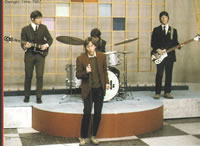 (L to R) Correll, Morgan, Figg, and Trabandt
(L to R) Correll, Morgan, Figg, and Trabandt
More importantly, it might have been the decision not to sign with a bigger record company that turned out to be the moment of truth in the Rationals’ career. In 1966, Jeep Holland spurned an offer from Jerry Wexler to have the band sign with Atlantic Records, and instead agreed to go with Cameo-Parkway. Holland apparently was a little too possessive of the Rationals to let someone else produce the group, which would have been the situation at Atlantic. As it turned out, Wexler’s interest in the band and its music might have been a major factor in his encouraging Aretha Franklin to record “Respect” for Atlantic some months later.
Convinced that “Leavin” Here” was still destined to be a hit, Holland had the Rationals record a second version of the song for their next single released in June, 1967. Backed with a cover of “Not Like It Is”, the second version of “Leavin’ Here” featured Glenn Quackenbush of SRC on organ, and even incorporated a few bars of Marvin Gayes’s “Baby Don’t Do It” into the mix. The record got a lot of airplay in Michigan, but nowhere else as the Cameo-Parkway label finally went out of business.
It was during this time that the Rationals recorded their most famous commercial. Written by Scott Morgan, “Turn On” was a promotional 45 rpm single produced especially for Danby’s Men’s Shop. The recording was similar to the rock and roll radio commercials being done by many popular artists of the day for companies like Levis, Coca-Cola, and Great Shakes. The difference was that fans of the Rationals could pick up a free copy of “Turn On” which included the lyrics, “Shop at Danby’s, clothes that really turn you on (and on and on and on)”, with a $5.00 purchase made at the store.
The Rationals’ final Jeep Holland-produced release on A-Square was a cover of a ballad first recorded by Chuck Jackson called “I Need You”. Featuring Morgan’s soulful vocal, it was selected for the band by Jeep Holland. “I Need You” was a classic, and it even quieted the rowdy rock and roll crowds at the Grande Ballroom when the Rationals performed it live. Capitol Records picked up the single after it peaked at # 3 on Saginaw’s WKNX Big 10 Survey and became a hit on Detroit radio, but their version of “I Need You” didn’t catch on nationally despite the fact that many music aficionados, including Jackie Wilson, felt that their soulful version was superior to the Jackson original.
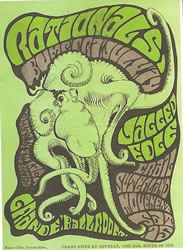
By the middle of 1968 cracks had begun to appear in the relationship between Jeep Holland and the band. Holland had been unable to generate interest at Capitol in any other recordings by the Rationals. As a result, some members of the band blamed Holland for the fact that they hadn’t become more successful. Now out of high school, they started to resent Jeep’s need to control everything, and they felt that he was neglecting their promotion because he was involved with too many other bands. The Rationals also wanted to move away from their “white soul” sound, and begin to write and perform more original material with a harder edge.
In his interview for the CD booklet for “Think Rational!”, Scott Morgan explained; “We were becoming adults, breaking all the strings that were attached to us, including our parents, and Jeep. All dear to us, but we had to grow up”. The band brought in Larry Feldman, manager of the Grande Ballroom, to help straighten out their financial problems (they each owed the government $10,000 in back taxes) and to manage the group.
The final single that Holland released by the Rationals on A-Square was strange affair that included one song by the Rationals (their cover of the Kinks’ song “I Need You”) on one side, and “Get The Picture” (the original choice to be the Scot Richard Case’s first single) on the flip. Probably a little resentful that they had been the first band to leave A-Square, Holland billed the latter on the record label as “The Old Exciting Scot Richard Case”.
Jeep Holland’s A-Square label was hurt by the departure of the Rationals and the Scot Richard Case, two of its most popular acts. By 1969, he also lost the Thyme when that group broke up. Holland had successfully booked Michigan bands as openers with Russ Gibb, who was bringing national acts to the Grande Ballroom. Holland and Gibb had a falling out however, over Holland’s commission check for bookings he made for the Detroit Rock & Roll Revival at the Michigan State Fairgrounds in May of 1969.
Known for being enthusiastic and honest, but lacking the financial skills and cut-throat attitude necessary to survive in the highly competitive music business, Holland’s A-Square operation crumbled and he fled Detroit for Boston in the wake of bounced checks and a line of creditors. Holland sold records in Boston and did some promotion before departing for Baltimore in the late 80’s. In Maryland, Jeep worked as a comic distributor until his death in 1998.
Free of Holland’s control, the Rationals now made some adjustments to their sound and style. Eschewing the matching stage uniforms, Scott Morgan resumed playing guitar and the band started performing a wider variety of songs on stage, including more original tunes.
They never seemed a comfortable fit with the revolutionary politics that were swirling around the MC5 and the Detroit rock scene in the late 60’s, however. Steve Correll looked back on those days in his interview for “Think Rational!”: “Our contact with John Sinclair was minimal. I couldn’t relate to the White Panther rabble-rousing. Deep down those guys were decent, and I enjoyed the music, but what they projected was too chaotic for me. The pressure to change and get radical, even with dress and music, went against my grain. I always thought that dancing was important when we played”. 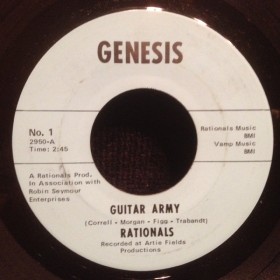
In that light, the Rationals recorded a single they had written together called “Guitar Army” that included the lyrics: “Some folks talkin’ ‘bout burnin’ down…I’m not talkin’ ‘bout burnin’ down…I’m just talkin’ ‘bout gettin’ down”. Released on the local Genesis label, the hard-rocking song was misinterpreted as being subversive by some, and may have represented too much of a change in sound for fans of the band. Their single was not a hit, and “Guitar Army” became better known as the title for a book John Sinclair wrote while in prison for the sale of two joints to undercover narcotics officers.
Following the release of the single, the Rationals played a residency at Steve Paul’s famous Scene music club in New York City. After seeing the band play at the club, the manager of Blood, Sweat & Tears offered Morgan a chance to audition for Al Kooper’s recently vacated position in the group. Scott turned down the offer to stay with the Rationals. Blood, Sweat & Tears selected David Clayton-Thomas as their new vocalist, and that band would go on to record two # 1 albums and three Top Ten singles during the next two years.
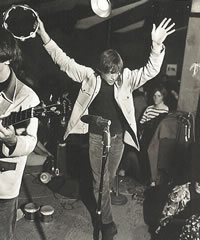 Rationals and Scott Morgan at Mt. Holly
Rationals and Scott Morgan at Mt. Holly
The Rationals recorded an album’s worth of material in early 1969 at the Artie Field’s Studio in Detroit. Because they no longer had a recording contract, their manager arranged for financial backing through Robin Seymour, who also helped get the album released on Crewe Records in 1970.
Simply titled, “The Rationals”, the album sold poorly despite containing compelling originals like “Guitar Army” and “Sunset”, as well as top-notch covers of “Barefootin’”, “Temptation ’Bout To Get Me”, and “Handbags And Gladrags”. It was produced by Fred Saxson, whose relationship with the band during the sessions was strained. The Rationals felt that Saxson was inflexible, and that they should have had more say in the recording. The producer, on the other hand, felt frustrated over the fact that there were so many people trying to provide input for every song on the album.
Larry Feldman quit after the album tanked, and Robin Seymour took over as the Rationals’ manager. By the summer of 1970, with their finances in disarray and band members arguing over the band’s musical direction, the Rationals called it quits after a gig in the Embassy Hotel Lounge in Windsor, Ontario.
Six months later, Scott Morgan would reunite with Terry Trabandt in a band called Guardian Angel, which eventually evolved into Lightnin’. In 1975, Morgan joined Fred Smith, formerly of the MC5, Scott Asheton of the Stooges, and Gary Rasmussen of the Up in the vastly underappreciated Detroit supergroup, Sonic’s Rendezvous Band. 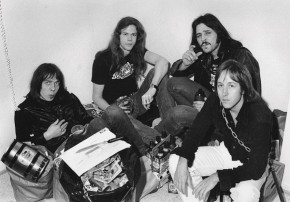 Sonic's Rendezvous Band: (L to R) Fred Smith, Gary Rasmussen, Scott Asheton, Scott Morgan
Sonic's Rendezvous Band: (L to R) Fred Smith, Gary Rasmussen, Scott Asheton, Scott Morgan
Following the demise of Sonic’s Renezvous Band in 1980, Morgan spent the rest of the decade fronting the Scott Morgan Band. In 1988, the band recorded the album “Rock Action” with both Asheton and Rasmussen. The drummer and bassist were also members of Scot’s Pirates, the band Morgan toured and recorded two albums with on Schoolkids’ Records during the 90’s.
There was a brief Rationals reunion in 1991. The first few gigs went well, but it soon relapsed into the bickering that drove the band apart in 1970. Both Bill Figg and Steve Correll were let go, and a horn section was added before the curtain went down for a final time on the Rationals in 1992.
In recent years, Scott Morgan joined former MC5 guitarist Wayne Kramer and Deniz Tek of Radio Birdman fame in a project called Dodge Main. The group produced one album on Alive Records. The turn of the century saw Morgan join forces with members of Sweden’s Hellacopters and Holland’s Nitwitz to form a Euro-American supergroup called the Hydromatics. Scott has also played and recorded with Powertrane and the Solution. In 2010, he released a new solo LP titled “Scott Morgan” on Alive Records, and is on the road with his current touring band, the Irrationals.
Bill Figg and Steve Correll are currently living in Michigan, and neither are currently active in the music business. Sadly, Terry Trabandt passed away at the age of 61 in December of 2010 in Fort Myers, Florida.
In June of 2010, the Rationals were one of six artists inducted into the Michigan Rock and Roll Legends internet Hall of Fame. "Respect" was voted a Legendary Michigan Song in 2016. "City Slang" was also inducted that year.
Dr. J. Recommends: 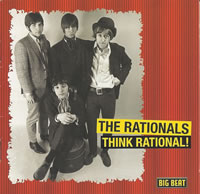
“The Rationals - Think Rational!”, 2 CDs, Big Beat Records/Ace Records 2009. This incredible collection of songs that the Rationals recorded on Jeep Holland’s A-Square label has been unavailable for years. Although it’s an import and a little expensive, this is essential listening for Michigan rock and roll fans. It also has an informative booklet with lots of photos.

